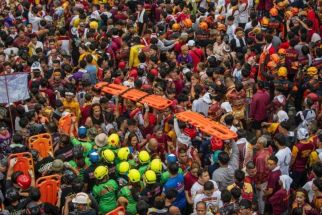Text messages delay Namfrel vote count
May 12, 2004 | 12:00am
The National Movement for Free Elections (Namfrel) admitted yesterday it was overwhelmed by the volume of election returns (ER) results sent via text messaging, saying this caused a delay in their tabulations.
Namfrel chairman Jose Concepcion Jr. told reporters transmission of data in previous elections’ Operation Quick Count was "slightly quicker than now."
In experimenting with the new text system for transmitting election returns for this year’s quick count operation, Namfrel had to deal with a sudden surge of text messages. During past quick counts, Namfrel volunteers transmitted their data using fax machines.
Reporters who had been awaiting the quick count results at the Namfrel tabulation center at the De La Salle Greenhills campus in San Juan since yesterday morning asked Concepcion about the delay in the transmission of the latest tabulation results. Namfrel had last displayed the latest election tabulations at 9 a.m.
"We have had some problems," he said. "Among the problems we are addressing is texting. We probably underestimated the load of people who are texting and, if you are in the province, you have limitations... so you have to queue. You have to wait for your turn."
In an earlier press conference, Namfrel said they took into consideration all possible problems that could disrupt Operation Quick Count.
Namfrel ran a test on text traffic via mobile phones and said cellular telephone companies have the capacity to transmit 200 million text messages daily.
During that test, Namfrel estimated that they would only consume 10 million text messages a day.
Concepcion said Namfrel has already taken measures to address the backlog and is confident that the poll watchdog will complete its quick count by May 17.
"We have taken remedial measures to use our fall-back position, which we are doing now," he said. "We want to be flexible, so we would have two alternatives to use. One remedy is to change mode from using text messages to using a spreadsheet program, such as Microsoft Excel, and send the data via e-mail."
The data verification process also consumes time, he said, because Namfrel double-checks its figures before putting them onscreen at the tabulation center.
"The problem (is), we also have to register (the data) counter-check (it) and get back just to make sure," Concepcion said. "We want to make sure that the data we post on our screen really reflect what we have received."
Namfrel has coordinated with Department of Education (DepEd) Undersecretary Jose Luis Martin Gascon to inform public school teachers serving on the Board of Election Inspectors (BEI) to give Namfrel representatives in their areas a sixth copy of the ER list.
"That is why I am personally calling the respective regional and provincial (Namfrel) directors to make sure that they get the sixth copy (of the poll data) and we have asked (Gascon) to deploy (DepEd) their superintendents of private schools throughout the country," Concepcion said.
Namfrel chairman Jose Concepcion Jr. told reporters transmission of data in previous elections’ Operation Quick Count was "slightly quicker than now."
In experimenting with the new text system for transmitting election returns for this year’s quick count operation, Namfrel had to deal with a sudden surge of text messages. During past quick counts, Namfrel volunteers transmitted their data using fax machines.
Reporters who had been awaiting the quick count results at the Namfrel tabulation center at the De La Salle Greenhills campus in San Juan since yesterday morning asked Concepcion about the delay in the transmission of the latest tabulation results. Namfrel had last displayed the latest election tabulations at 9 a.m.
"We have had some problems," he said. "Among the problems we are addressing is texting. We probably underestimated the load of people who are texting and, if you are in the province, you have limitations... so you have to queue. You have to wait for your turn."
In an earlier press conference, Namfrel said they took into consideration all possible problems that could disrupt Operation Quick Count.
Namfrel ran a test on text traffic via mobile phones and said cellular telephone companies have the capacity to transmit 200 million text messages daily.
During that test, Namfrel estimated that they would only consume 10 million text messages a day.
Concepcion said Namfrel has already taken measures to address the backlog and is confident that the poll watchdog will complete its quick count by May 17.
"We have taken remedial measures to use our fall-back position, which we are doing now," he said. "We want to be flexible, so we would have two alternatives to use. One remedy is to change mode from using text messages to using a spreadsheet program, such as Microsoft Excel, and send the data via e-mail."
The data verification process also consumes time, he said, because Namfrel double-checks its figures before putting them onscreen at the tabulation center.
"The problem (is), we also have to register (the data) counter-check (it) and get back just to make sure," Concepcion said. "We want to make sure that the data we post on our screen really reflect what we have received."
Namfrel has coordinated with Department of Education (DepEd) Undersecretary Jose Luis Martin Gascon to inform public school teachers serving on the Board of Election Inspectors (BEI) to give Namfrel representatives in their areas a sixth copy of the ER list.
"That is why I am personally calling the respective regional and provincial (Namfrel) directors to make sure that they get the sixth copy (of the poll data) and we have asked (Gascon) to deploy (DepEd) their superintendents of private schools throughout the country," Concepcion said.
BrandSpace Articles
<
>
- Latest
- Trending
Trending
Latest
Trending
Latest
Recommended





























